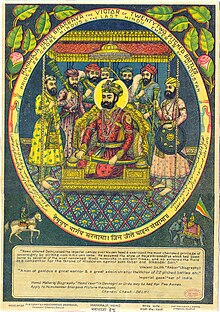Hemu
Hemu (also known as Samrat Hem Chandra Vikramaditya, † November 5, 1556 at Panipat ) was military leader and first minister of the last Surid ruler Adil Shah Suri , a power competitor of the Great Mughal Humayun .
biography
Hemu was a Hindu son of a simple businessman from the Mewat region . He spent his childhood and early youth in the town of Rewari, southwest of Delhi . Somehow he came into contact with the 2nd Surid ruler Islam Shah Suri , who recognized his abilities and accepted him into the army after 1545. Here he was supposed to act as a counterweight to the Afghan officers, who were constantly in danger of misusing their functions for their own benefit. He was also assigned to watch Kamran Mirza , Humayun's brother. Islam Shah died in October 1553; his only 12-year-old son Firoz Shah was killed a few days later. Adil Shah Suri succeeded him; he made Hemu his general and first minister.
Hemu was in Bengal when he heard of Humayun's death (January 1556); he gathered his army and within a few months conquered large parts of northern India, including the city of Agra . In the battle of Tughlaqabad on October 7, 1556 he achieved a major victory over the Mughal army and was able to take Delhi. He took the title Vikramaditya , which he placed in a long line of Indian rulers with this surname. Whether he wanted to document an independent position towards Adil Shah is controversial; in any case, after 350 years of foreign Islamic rule, he was the first Hindu ruler of Delhi.
On November 5, 1556, near the city of Panipat, 90 km north of Delhi, a battle took place between the Mughal army and the troops of Hemus, whose army was on the verge of victory when he was hit by an arrow in the eye, whereupon his soldiers fled. The war elephant , on which Hemu was sitting unconscious, was taken to the Mughal camp. Their general Bairam Khan asked the 13 or 14-year-old Mughal emperor Akbar I to behead Hemu, but Akbar allegedly replied that he would not kill any dying person. So Bairam Khan took on this task himself; Hemu's head was then sent to Kabul and displayed there.
aftermath
Hemu's father was killed by a Mughal officer; however, his wife managed to escape. Adil Shah was killed in April 1557. From then on, war elephants formed an essential part of the Mughal army.
meaning
Hemu is considered by many to be the last great Hindu opponent of the Mughals. He is known all over India.
literature
- Jadunath Sarkar: Military History of India. Orient Longmans 1960, pp. 66ff.
- Kalika Ranjan Qanungo: Sher Shah and his Times. Orient Longmans 1965, pp. 448f.
- Satish Chandra: Medieval India: From Sultanate To The Mughals, Part II: Mughal Empire (1526-1748). Har-Anand Publ. 2004, pp. 91ff. ISBN 978-8124110669 .
Web links
- Hemu, Biography (English)
| personal data | |
|---|---|
| SURNAME | Hemu |
| ALTERNATIVE NAMES | Vikramaditya, Samrat Hem Chandra |
| BRIEF DESCRIPTION | General, adviser and regent for the Surid ruler Adil Shah Suri |
| DATE OF BIRTH | 15th century or 16th century |
| DATE OF DEATH | November 5, 1556 |
| Place of death | at Panipat |
